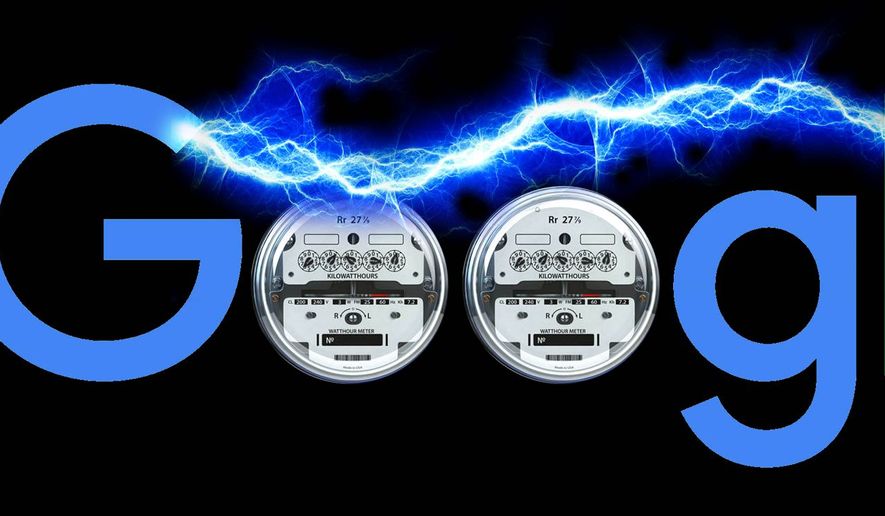OPINION:
How excited would you be about the possibility of Google owning and operating your local electric utility? Or controlling how electricity gets to you? Maybe let the company spread some of its energy costs around the neighborhood, maybe sell some of your information?
Does that sound good?
Well, it’s a distinct possibility. The road to Google controlling electricity markets runs right through relatively obscure but crucial quasi-governmental operations called regional transmission organizations, or RTOs.
In about two-thirds of the nation, RTOs are responsible for making sure electricity gets to you. They are kind of multi-state utility commissions. They operate electricity transmission systems, usually across state lines, and — most importantly — their rules determine who gets paid what.
That power would be tremendously helpful if you wanted to control a significant chunk of the electricity market in the United States.
These organizations evolved in the early 1990s as part of the movement to introduce competition into electricity markets, but after 30 years or so, they have the feel of a failed experiment.
For example, despite numerous efforts, no one can really say whether these organizations have led to lower costs or higher costs or changed costs. In fact, no one seems very interested in finding out whether they’ve had any effect on cost at all.
The Virginia State Corporation Commission in April approved a rate increase of an average of $11 a month in the western part of the state. The utility (Appalachian Power) told the commission the hike was needed because there had been a 50% increase since 2018 in the service charge the power company pays to PJM, the RTO that oversees the power grid in Virginia (as well as 12 other states and the District of Columbia).
What about reliability? Well, these organizations were in charge of the grid in Texas when it had its fatal blackouts in February and in California when the state saw rolling blackouts in 2020. Just a few days ago, the North American Electric Reliability Corporation reported that Texas, California, New England and the Midwest — all run by RTOs — should get ready for blackouts this summer.
If you care about building high-voltage transmission, whether because you think it is necessary to achieve environmental goals or economic benefits or whatever, you need to look elsewhere as well. As former Federal Energy Regulatory Commission Chairman Joseph Kelliher notes, nearly a decade after FERC instituted a regulation specifically designed to encourage the building of transmission, “not one inter-regional project has been developed and most transmission development within (RTOs) is limited to local rather than regional projects.”
If you care about keeping people alive, RTOs might not be for you, either. More than 200 people died in this year’s Texas cold snap, most of them as a direct result of mismanagement by the system operator in Texas. In the case of California wildfires, the system operator failed to create or oversee a vegetation management plan that would have minimized the damage from the fires.
Apart from questions about performance, everyone should be concerned about the lack of accountability. Unlike state utility commissions, the boards and leadership of RTOs are appointed by no one, elected by no one and accountable to no one. That’s especially alarming because — despite having no statutory authority — they are responsible for the provision of an essential product – affordable, reliable electricity.
Who, then, is in favor of them and why?
Some environmentalists like them, because they believe — incorrectly — that utilities would never build a system that will reduce greenhouse gas emissions. Multiple studies have concluded that a fully electrified economy would require twice as much electric generating capacity as we have now and two to three times as much electric transmission capacity as currently exists.
Only utilities, independent transmission companies and merchant generators are capable of building that much generation. The RTOs will simply get in the way.
Who else likes RTOs and wants to require everyone to join one? Big Tech, led by Google.
Why would they be interested? Because if you wanted to control the electricity market, RTOs are the best place to do it. Because RTOs are a good way to separate utilities from their customers. Because they are a good way to socialize Google’s energy costs and privatize benefits. Probably because as far as Google is concerned, the electric utility industry needs to be disrupted irrespective of what happens to customers, reliability and rates.
It can’t be accidental that a number of groups funded by Big Tech recently signed onto a letter to Senate and House leaders insisting that utilities be required to join RTOs.
Think about that for a moment. If you have to be required by law to join an organization, it probably says something about that organization.
If Google and its friends don’t intend to make money on electricity — and electricity consumers — they wouldn’t be funding groups, hiring advocates, and sending letters to members of Congress through their trade associations about the issue.
When the world’s largest companies want to control one of life’s essential commodities, everyone — Republicans, Democrats, independents — should be nervous.
• Michael McKenna, a columnist for The Washington Times, is the president of MWR Strategies. He was most recently a deputy assistant to President Trump and deputy director of the Office of Legislative Affairs at the White House.




Please read our comment policy before commenting.